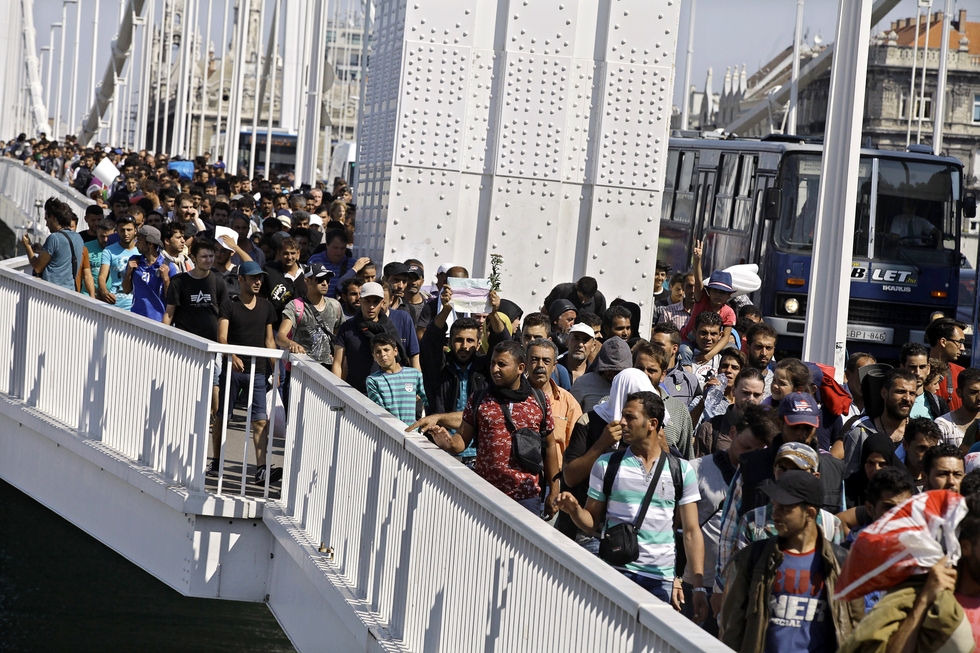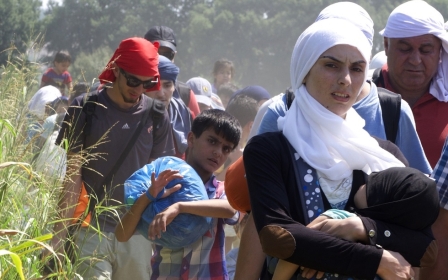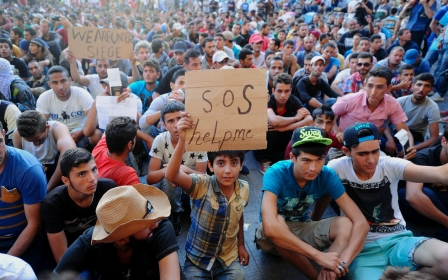Thousands of refugees begin march from Budapest to Vienna

Thousands of refugees broke through a police barricade earlier on Friday and flooded one of the main motorways in Budapest, Hungary, determined to reach neighbouring Austria by foot.
The huge crowd included people in wheelchairs and on crutches, as well as parents carrying children on their shoulders, all prepared to march 175 kilometres to the border.
For four days, Hungary's government has prevented refugees from boarding trains to go to Germany, as part of the country's tightening control on migrants.
Hungarian authorities said that the refugees did not carry EU visas, and could not board the trains.
In a statement, Hungarian Railways (MAV) announced the suspension of all train services from Budapest to West Europe.
"In the interests of rail travel security the company has decide that until further notice, direct train services from Budapest to Western Europe will not be in service," Hungarian Railways (MAV) said in a statement.
Consequently, many of the refugees- estimated to be around 2000- set up makeshift camps in a clear message that they were not going anywhere until they were allowed to continue their journey.
However Hungary's prime minister said late Friday that the nation would lay on buses to take refugees to the border town of Hegyeshalom if they wanted.
Around 100 buses would be laid on, with rides also offered to more than a thousand migrants staying at a makeshift refugee camp at Budapest's Keleti station.
"During the night, buses will be brought to Keleti train station and to the M1 motorway where transport to the Hegyeshalom border crossing will be offered to the migrants," Prime Minister Viktor Orban's chief-of-staff Janos Lazar told a press conference.
"The top priority is that Hungary's transport should not be crippled," said Lazar, explaining the decision.
According to an AFP correspondent, police have not intervened or tried to stop the refugees from marching.
At the Bicske train station, where a refugee camp was set up, hundreds of refugees reportedly managed to escape from the camp and are marching along the railways.
At the same time, Hungarian lawmakers have agreed on tough new anti-immigration measures, including criminalising illegal border crossing and vandalism to the new anti-immigrant razor-wire fence erected along its 175 kilometre border with Serbia.
The UN refugee agency reported yesterday that a record of 3,300 refugees crossed into Hungary on Thursday.
The right-wing government headed by Prime Minister Viktor Orban has responded to the influx by introducing new measures such as three-year jail terms for people climbing over the razor-wire fence, as well as new border "transit zones" to hold asylum seekers while their applications are being processed.
Lawmakers also declared a "state of crisis caused by mass immigration," which allows the police and army to assist in registering asylum applications and operate detention facilities in registration camps.
"If we do not protect our borders, tens of millions of migrants will keep coming to Europe," Orban said in a statement on Friday.
"If we allow everyone in, that is the end of Europe. We may one morning wake up and realise that we are in the minority on our own continent."
New MEE newsletter: Jerusalem Dispatch
Sign up to get the latest insights and analysis on Israel-Palestine, alongside Turkey Unpacked and other MEE newsletters
Middle East Eye delivers independent and unrivalled coverage and analysis of the Middle East, North Africa and beyond. To learn more about republishing this content and the associated fees, please fill out this form. More about MEE can be found here.



